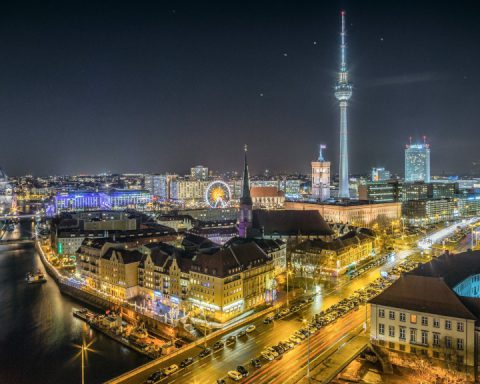The British Embassy is urging UK expats to get German driving licences as soon as possible. If there is a no-deal Brexit on 29 March, the UK/EU licence will not be valid. In the worst-case scenario, there’s a risk that Brits might have to pass new driving tests (theory and practice), and pay €6.43 for an eyesight test too, in order to drive on German roads.
At the Technisches Rathaus in Leipzig, the waiting list for an appointment to swap British for German driving licences is already two weeks long. It can take up to one month before drivers receive their new licence. The application costs €35, and you can book an appointment online.
Of course, driving is not the only aspect of life that is about to become more complicated for Brits in the EU.
The German authorities call “no-deal” a “disorderly Brexit.” They are ready for it: the Interior Ministry plans a three-month period of grace (up to the end of June 2019), during which UK citizens remain legally resident and can apply for an appropriate residence permit.
Sir Sebastian Wood, Britain’s Ambassador to Berlin, has written to expats explaining the situation via The Local:
There are a number of outstanding issues on which we could not yet reach an agreement. (…) We recognize the great importance of these issues to many UK citizens in the EU and will continue to raise these in the negotiations on our future partnership with the EU.
And he has sent his staff to tour German cities with a message of reassurance. The next scheduled meeting is in Berlin on 4 March 2019.
But when asked on behalf of LeipGlo for a statement about how UK citizens residing in Saxony should proceed, press spokesperson Antje Becher at the Foreigners’ Office in Chemnitz had no information.
Frau Becher said: “Since at the present time it is not possible to estimate what might be the consequences of Brexit for British people living in Germany, unfortunately it will not be possible to give you an interview.”
The uncertainty adds stress to a situation in which many thousands of Brits might be forced to change their nationality in order to keep their homes, jobs and relationships – something which they could not have foreseen if they moved to Germany before the Brexit referendum.
James Parsons, a UK citizen and father of three who works at Wordcraft in Leipzig, told LeipGlo: “As it stands now, I have to become German to stay European. I love Leipzig and have got nothing against the Germans. For me it is just a question of authenticity. I am not German. I am lucky enough to have a job and my kids have both nationalities.”
I feel sorry and worried for the Brits here who want to stay but have no regular income or family here. Brexit was unnecessary and is today a lose-lose situation for everyone.
A record number of British people applied for German citizenship in 2018 – up by about 360% from 2015, according to the national statistics office Destatis. To be granted citizenship, you must have lived in Germany for eight years (less under special circumstances).
Applicants must take a general knowledge test covering the history and culture of their new homeland, as well as a German language competency exam (the authorities require at least a B1 or B2 level, also depending on the circumstances). The cost of applying for German citizenship is €250.
Holocaust victims get special terms
An exception to these rules covers all relatives of Holocaust victims. If they can prove that their families were expelled or murdered in death camps during the Nazi regime, they and their families can automatically gain or regain German nationality. And they can make a claim for the value of houses or assets that were seized from their ancestors by the Nazis.
One famous example is the retired BBC journalist Robin Lustig, known to millions of expat listeners around the world as the former presenter of BBC Radio 4’s The World Tonight. He explained in a newspaper article how Brexit drove him to take the momentous step of joining the country that had persecuted and killed his relatives – all except the few who found refuge in the UK.
If the Lustigs do decide to relocate to their ancestral home in Magdeburg, they will be reassured by a statement from the UK government that all British pensioners who live in Germany will keep their state and private pension payments after the UK quits the EU. These benefits will hold their value, rising in line with pensions in the UK – at least until 2020.
But if they (or any other Brits) want to bring their pets to Germany, they will have to hurry to get them ready. Pets must be microchipped, vaccinated and then tested for rabies antibodies. This test is taken three months after the vaccination. If the antibodies are present, the cat, dog or ferret will then be issued with a pet health certificate, valid for four months. Only then will it be allowed to travel. These rules apply to all EU countries, not only Germany.

British businesses in Germany have their own worries. Still, the British German Chamber of Commerce is on the case, and reports that Brexit may even bring benefits for some companies.
It all depends on the terms of the Brexit Deal. British Embassy representative Nicholas Teller told a packed meeting of more than 200 Brits at the Anglican church in Dresden on 11 January that “Under the Withdrawal Agreement (Brexit Deal), UK nationals will retain full rights as EU citizens right up to the end of the transitional period (December 2020).”
However, a no-deal Brexit on 29 March 2019 remains a strong possibility. In that case, there will be no transitional period.
The meeting in Dresden, and others elsewhere in Germany, included many members of British In Germany (BIG). This group is campaigning for more rights and, above all, more information. Other groups have sprung up on social media, including Brexpats Hear Our Voice, which is comparing the no-deal Brexit preparedness of Spain, Denmark and Germany.
Clarissa Killwick is the Brexpats’ spokesperson. She told LeipGlo: “There are feelings of anxiety, anger and confusion. Together with our EU counterparts in the UK, we are a group of five million people who have been in limbo for over 900 days.”
Information on preparing for a “no deal” has been patchy and came several months after the UK government started spewing out their technical notices.
Another Facebook group, the In Limbo Project, has published two books detailing changes to rights and status that will follow UK’s exit from the European Union. So although Brits abroad typically try to avoid other Brits, it seems the common need for information and reassurance means they are now creating their own communities online. And they are sharing knowledge and support with EU citizens living in the UK, who face a confusing set of structures called “settled status” and “pre-settled status”.
BIG has a checklist of what UK citizens must do now to ensure that they have the best possible Brexit, even without a deal. Tips include:
- get a German driving licence,
- register with the local foreigners’ authority (Ausländerbehörde),
- transfer savings from UK into German bank accounts, in case the pound crashes in value,
- stay in Germany on the Brexit weekend of 29-31 March (UK Mothers’ Day), since travel could become chaotic because of the lack of international agreements.
The BIG to-do list includes (perhaps a little tongue-in-cheek) a tip that gives Brits the possibility of gaining German citizenship after only three years instead of the usual eight years of residence: “Marry a German,” they recommend.
Ah, that British sense of humour! Europe will miss it when they’re gone…
By Jane Whyatt
Jane Whyatt is a British citizen living in Leipzig.









